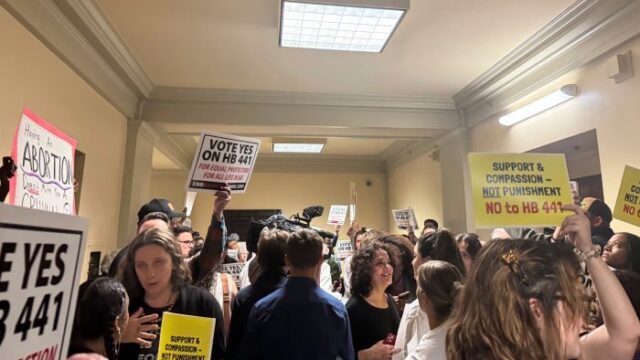(SRN NEWS/AP/97.5 GLORY FM) – A crowd of protesters on each side of the abortion debate flooded a windowless Georgia Capitol hallway Wednesday with chants and signs as lawmakers held a hearing on a bill introduced by Rep. Emory Dunahoo (R-Hall County) that would ban the procedure in almost all cases.
Although the bill will not go anywhere this year because a deadline has passed for consideration by both chambers, the hearing granted by the House’s Republican leadership gave anti-abortion activists a chance to speak out on an issue near and dear to their constituents.
Dozens milled about and shouted words of support or disdain for the proposal. Onlookers tried to squeeze into the hearing room as sheriff’s deputies guarded the area. One man raised his voice above the noise and said, “I’m so thankful that my mom gave me life” and did not “sacrifice” her children.
Each time someone left the room after testifying, they were met with cheers from those on their side of the bill.
“Tens of thousands of babies made in the image of God continue to be murdered in our state every year,” Dunahoo told the House Judiciary Committee (Non-Civil) Committee. “This bill simply ensures that those same laws protecting the lives of people after birth equally protect the lives of people before birth.”
Dunahoo’s bill provides exceptions for spontaneous miscarriages, situations where a woman is pressured to undergo an abortion, and cases where doctors are trying to save the life of a mother. But it does not allow exceptions for victims of rape or incest.
The bill would make most abortions a crime from the point of fertilization, at which point one would be considered a person, and classify the procedure as a homicide. It would expand Georgia’s broad “personhood” law, which gives rights such as tax breaks and child support to unborn children. At least five states have personhood laws.
Georgia already bans abortions after finding a “detectable human heartbeat,” which can happen as early as six weeks into pregnancy, when many women still don’t know they are pregnant. Still, a flurry of religious leaders said the measure doesn’t go far enough.
Some religious anti-abortion individuals were among the bill’s opponents, though, saying it goes too far with criminalization.
Dr. Karenne Fru, who runs a fertility clinic that provides in vitro fertilization, said the bill would put her out of work.
“My whole life is doing God’s work. He said go forth and procreate,” Fru said, her voice shaking. “I’m doing that. Please just let me continue to do that. I cannot go to jail because I want to help people become parents.”


